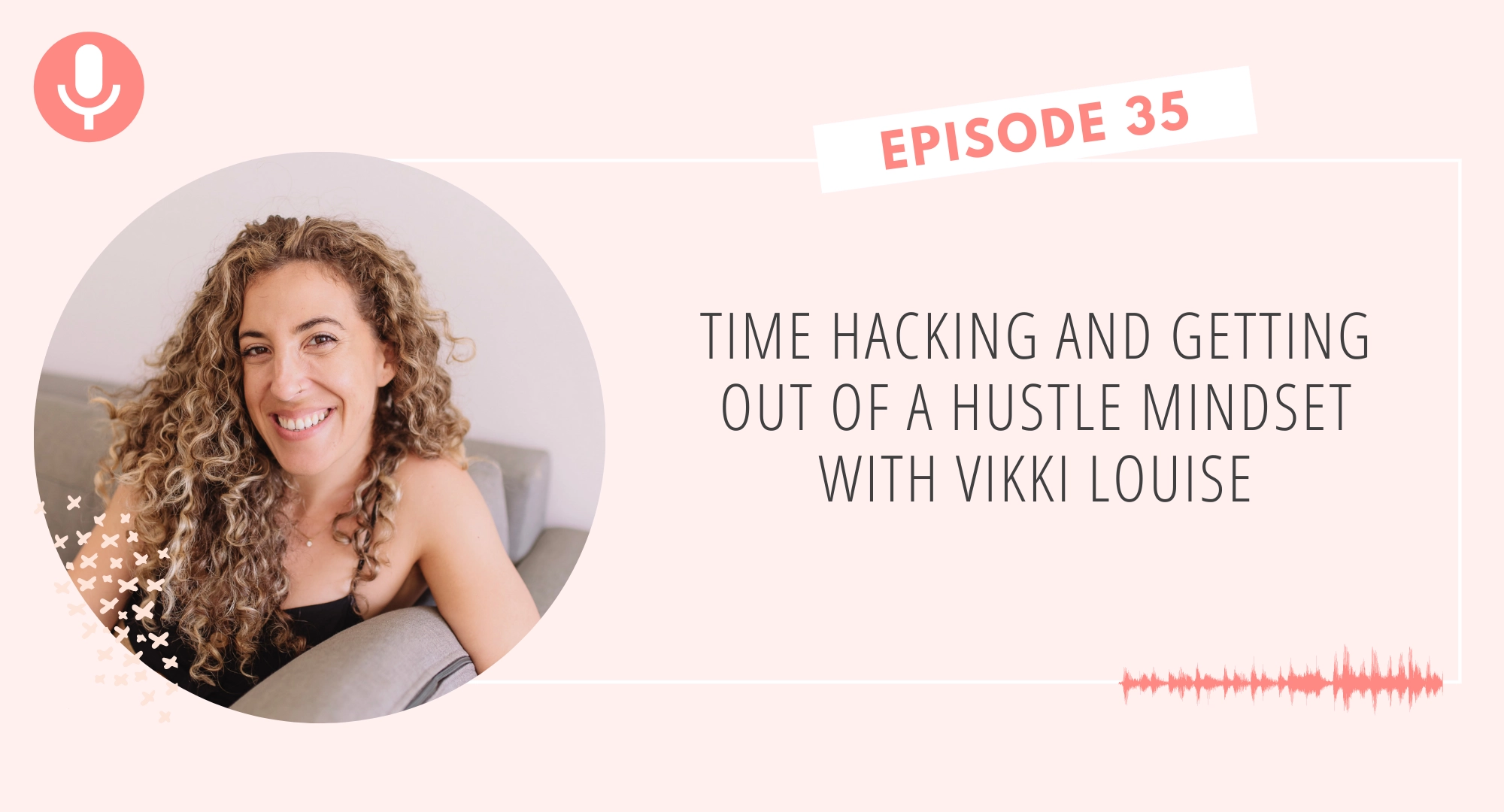Struggling to get the results you want from your emails?
Discover 15 simple yet powerful ways to elevate your email marketing and start seeing real engagement!
Grab your freebie!
Blog Categories
Helping small business owners, virtual assistants, and creative entrepreneurs grow their business.
Hi, I'm Tara! I'm a multi-passionate business and marketing coach.
learn more + get a copy:

The hustle culture in today’s society still relies on a time of having to hustle to differentiate yourself. There was a time and place for hustling to build your business, but with all of the new technology we have today, you can reach someone on every continent in a matter of seconds. Time is such a valuable resource and when it is used to constantly recheck your drafted social media post for typos, for instance, it can actually cause you to waste precious time that could be spent on other valuable business tasks. That’s not to say that typos are a good or bad thing, but once you rewire your brain to think in a different way, time hacking can become a great asset for you. It’s time for you to leave behind the hustle mindset and start hacking your time wisely to work less while making more of an impact.
Disclaimer: I earn from qualifying purchases. Some of the links on my website are affiliate links, which means, at no additional cost to you, I will earn a small commission if you click through and make a purchase.
Our guest on the podcast today is Time and Productivity Expert, Vikki Louise. She helps busy overachievers to achieve more in less time, with ease. She calls herself a reformed hustler and used to work 80 hours weeks, doing all the things. Now she works 15 hours, achieves more, earns more, and helps other people do the same through her Time Hackers coaching program. She also hosts the Hack Your Time podcast.
In this episode, Vikki and I dive into:
- How she went from the ultimate hustler to becoming a time and productivity coach and expert
- Being in hustle mode and unlearning that mentality that society taught us
- Getting stuck in the perfectionism trap and getting out of it
- How to hack your time and using it to your advantage
- …and much more
How the Ultimate Hustler Became a Time and Productivity Coach
As a self-proclaimed hustler, Vikki was running her very own startup business, hosting three events per week, getting an MBA, and planning a wedding all at one time. What else could she take on? She wanted to have an extraordinary life and this was the only way she thought she could achieve that at the time. Not only what she hustling in her business, but she was also hustling in her social life. Being a people pleaser, she would say yes to all the things while her mind was always elsewhere, so she had to manage her social life all from her phone. After closing down one failed business, she started her coaching business and went all in. At the same time, she got hired by the school she was certified with to begin coaching for them for 20 hours a week. There was a breaking point in March of last year while working six days a week in her coaching business. She hadn’t started making a higher income in her business yet and she was living at her parent’s house with her husband to help save some money while they got back on their feet. She had to drop the comfort of working more hours to achieve more, which led her from making $5K to $25K for the first time.
Within six months, she had created a six-figure business. How was this even possible? She had always been told it wasn’t. She even put off her coaching business because she thought her startup was a more proper business. Six weeks later, Vikki actually doubled her revenue again, which made her question how it was happening. Throughout her life, she was told that things like this would take time, but here she was discovering that it actually doesn’t take that much time at all. How could she package this up and share it with others, so that they can recreate it for themselves, too? This is how her Time Hackers program was created because of the fact that you aren’t taught how to optimize your time. What you are taught about time is how to use it, how to fill it, to say yes, make plans, and fill your schedules, but you are not taught to consider the least amount of time doing something to create the biggest impact. That is what time hacking is all about for Vikki.
Struggling With and Unlearning the Hustle Culture Mentality
When you launch your business you are met with the constant hustle of throwing everything you’ve got into your business for the first few years because that’s what you are told to do and it can be very exhausting. There’s no education around how to build a business when it comes to how you use your time. There is a corporate mentality of working in a huge corporation that Vikki speaks of where she asks, how do they track you? How do they pay you? It’s usually by the hours you work. As an entrepreneur, the hours worked are irrelevant because the focus is more on creating success. One of the most important roles of entrepreneurship is creativity. Creativity blossoms with space, not with a large list of to-do’s. It can be easy to get lost in the busy work that sometimes the creativity may be hard to get back, but you need to make space for the creativity to flow. The funny thing about busywork is that we live in a society now where there are so many social media platforms, so you can always find something to keep you busy. To Vikki, if people dropped the right 50% of doing things in their business it would positively impact your business. It won’t negatively impact your business, but will initially slow you down 5% and accelerate you 30% to 40%.
The hustle mindset of 20 years ago meant that you had to differentiate yourself by making that call on a Sunday to go the extra mile, but that’s not the case anymore with the technological changes we’ve experienced over the years. You can actually reach people so much faster now, even with a podcast. There is a quicker turnaround time to get it from unedited audio to finished product ready for listeners to tune in. There is more of a sense of instant gratification with less effort. A lot of what women inherited in terms of the work time culture was created without us in mind at all. Everything from a five-day workweek to the nine to five just isn’t considerate of women, cycles, hormones, and pregnancy. Coming from my past experiences and Vikki’s, she says that no matter where you are, even if that’s working 80-hour weeks, then remember that you can change that at any time.
Getting Stuck in the Perfectionism Trap and How to Get Out Of It
All entrepreneurs tend to struggle with perfectionism, but introverted entrepreneurs especially get stuck in the trap. The perfectionist loop to Vikki is what you are doing on purpose by sitting yourself in constant imperfection because perfectionism by definition is having you look and try to create perfection, which means your brain is focused on what’s wrong the whole time. Your brain isn’t thinking, how can I create more value for my customers? How can I improve this process? It is actually thinking, let me look for what’s wrong and find it. Some people have even said to Vikki that their perfectionism is useful because it helps them create perfect work, but what you are doing instead is looking for problems that aren’t actually going to create more value for your clients.
Start messy, Vikki says, and find one thing that you are a perfectionist about like checking your emails seven times, and only reading them once or twice a day to build a track record of not being a perfectionist, and showing your brain that it’s okay to be imperfect. Checking your email several times or constantly checking for typos on posts and graphics is going to cost you a lot of valuable time, creativity, self-trust, and essentially revenue.
Thinking About the Fear of Failure In a Whole New Way
Do you fear failing in your business? Does it stop you from being your authentic self online and sharing what your ideal clients need to see? We completely evolved to have a fear of failure because we want to remember our brains have been around and in its most modern form for about 40,000 years. For most of that 40,000 years, failure meant failing to find adequate shelter, failing to pick the wrong berries, getting poisonous ones, and failing in a fight with a predator. The first thing to remember is that the fear of failure is not a problem. You want to train your brain to start seeing failure differently. If you do fail, then acknowledge that you have survived and that it wasn’t as bad as you thought it was going to be.
In Vikki’s case, when she failed and closed her startup and moved back to England, the shame and embarrassment kicked in. Then it really made her feel invincible because she was like, oh, that’s as bad as it’s gonna get? She is now willing to fail because she knows she will survive it. Be willing to fail to teach your brain. A third of her program is about mastering fear of failure because it’s such a big thing. It is what creates success.
One of the things that she has her clients do, instead of just celebrating success, she has them celebrate fails. What you are doing is rewiring your brain away from it being a problem into this is a great thing because failing is required to learn. When you fail, you are literally hacking away at how to create success and building that blueprint. That blueprint is repeatable. What would be different if we were all celebrating fails? You tried to do this launch and you completely failed. Here’s why. Instead of I failed, I’m going to go eat cookies on the couch and pretend it didn’t even happen. That’s the more expensive use of our time is having our fear of failure and letting that fear stop us from taking the lessons. You succeed by failing, learning, and applying what you’ve learned.

How to Hack Your Time to Use It To Your Advantage
Time and how you use your time is constantly evolving based on your situation. It could be starting a family. It could be kids moving out. It could be launching a business or doing a second business. Closing a business. Things don’t take time and this is why Vikki created her coaching program called Time Hackers, which is kind of like anti-time management. Hacking, by definition is a way of doing something that’s not been done before. It’s taking the standard route to do something, but hacking it and going through an alternative route to figure out a better way to do it. As time hackers, you focus only on three things, which in Vikki’s experience and her clients’ experience, has you moving quicker than time in terms of your growth.
Hack Your Brain
Hack Your Decisions
Hack Your Fear of Failure
How can you rewire your brain so it’s on track? How can you think about yourself? Your brain is a tool for you because often your brain can feel like it’s working against you. When it comes to your decision making, how do you make decisions for sustainable success when you have a brain that’s wired for short-term thinking, and comfort and pleasure over discomfort? Then for fear of failure, when people join the program, they get access to the portal, all trainings and everything it takes to become a time hacker, as well as how to succeed in the program. How to hack the program is the first module. It’s about building community around this because what you will do in this room is very different to what you are taught about time in the mainstream mass market. Community is super valuable, and learning everything that you’ve been taught about time and being willing to take it on in a different way. There is also live coaching every week, and additional courses for a lifetime access once enrolled in the program.
The Time You Put In and Your Return on Investment
When you think of ROI or return on investment, do you automatically think about money? Really, you need to think about it in terms of your time and the hours that you’re putting in, based on that return on your time investment, just not the money investment. Vikki actually did an event called The Time Investing Sprint, and it was this exact thing where she taught people how to calculate return on time invested, so you can start making decisions, and investing time for return. The mainstream market is still very much speaking about money, which is fine because you are starting to see people prioritize life and balance. That’s what’s coming up in the world, which is amazing to see. In terms of social media, people will be like, oh, you’re not using LinkedIn? What about Twitter? It’s now like, where is it working? Where can you build actual community and relationships? Just go there. There are a million platforms, but where are you creating the results that you want? Just do that.
Vikki gave so many insightful tips on using time as your most valuable resource through time hacking and getting out of the hustle mindset, especially as an introvert on this podcast episode today. She shared how she went from the ultimate hustler to becoming a time and productivity coach and expert, being in hustle mode and unlearning that mentality that society taught us, getting stuck in the perfectionism trap and getting out of it, the fear of failure and thinking about it in a whole new light, how to hack your time and using it to your advantage, and using the time you put in and getting a return on that investment.
Don’t forget to follow Vikki on Instagram for more valuable tips on time hacking, productivity, and leaving the hustle culture. Her Hack Your Time Podcast is another great resource for quick, actionable tips on having more time. If you want to dive deeper into the work Vikki does with her clients, then be sure to check out her Time Hackers program, especially if you are an entrepreneur.
What is one way that you can practice rewiring your brain this week as a time hacker? If you are a perfectionist, find one thing that you can be a little less perfect about. It’s okay to be imperfect.
a breakdown of this episode
[1:45] How Vikki, as the ultimate hustler, became a time and productivity expert and how her love of productivity started
[5:12] Being in hustle mode and how to unlearn that mentality
[12:48] Getting stuck in the perfectionism trap, especially as an entrepreneur and actionable tips to get out of it
[17:11] The fear of failure in your business and being able to look at failure in a new light
[21:31] Vikki’s Time Hacker’s program, who it’s meant for, and how to take advantage of time hacking for yourself
[26:06] Investing your time, making decisions based on your time, and your return on that investment
If you enjoyed this episode, I invite you to take a screenshot and tag me on your Instagram stories @introvertcoach and tell me your biggest takeaway!
resources mentioned this episode:
Tara Reid is a multi-passionate business and marketing strategist for introverted entrepreneurs who want to grow without relying on hustle culture or social media. With 18+ years of online business experience, she helps course creators, service providers, and digital product sellers build sustainable businesses through evergreen marketing, blogging, SEO, Pinterest, and email.
As the founder of the Introvertpreneur Club, Tara’s mission is to show heart-centered entrepreneurs that you don’t have to be loud to be successful. You just need the right strategies that fit your personality.
When she’s not supporting clients or creating new resources, you can find her at home in Canada with her three rescue dogs, a cup of coffee in hand, dreaming up her next project.
The Introvertpreneur Podcast
listen in to the top rated business podcast that is designed for introverted entrepreneurs who want to grow + scale in a more sustainable and fun way!
Top rated podcast
This one's on me. Complimentary free stuff coming right up.
leaving so soon?
Look behind the curtain and see exactly what I do every week, month, and quarter, to market my business without social media (in under 5 hours per week)!
The Quiet Marketing Playbook
Take this free quiz and learn what your superpower is as an entrepreneur. You'll also get a curated list of my best resources and tips for using your superpower to your advantage!
What's your Introverted Superpower?
Best Free Resources:
dig into 'em now!
A business strategist and marketing coach who focuses on helping course creators, coaches, and service providers, build sustainable businesses without social media.
